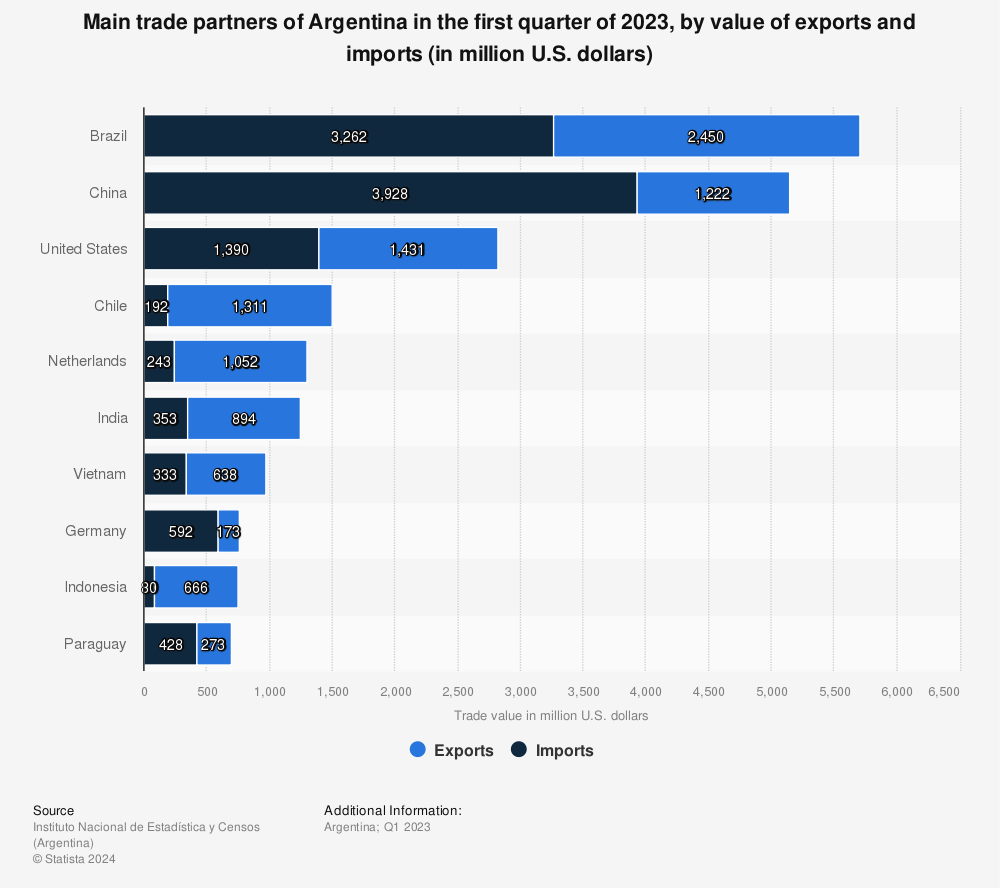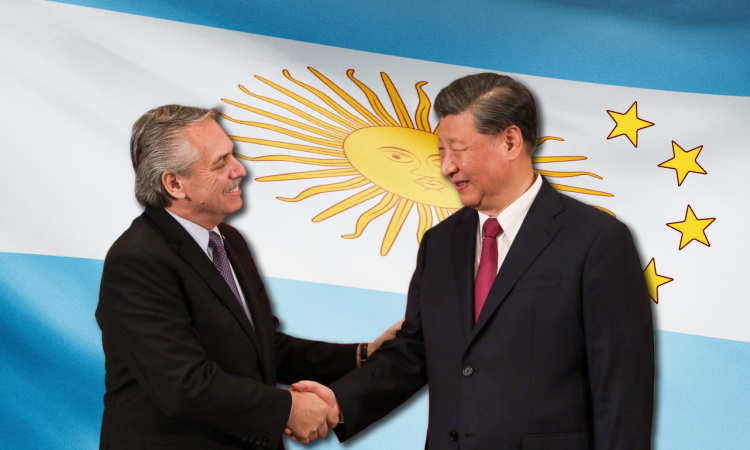On August 24, 2023, the emerging-economy bloc BRICS (an acronym for Brazil, Russia, India, China, and South Africa) invited six countries to become new members of the group in its assembly in Johannesburg, South Africa. After Argentine President Alberto Fernández formally asked BRICS to include his country in 2022, BRICS invited Argentina to join. By opening the door, Fernández has given Chinese and Russian tyrants a diplomatic victory over the United States in exchange for access to corrosive Chinese capital.
The bloc submits to Chinese Communist Party (CCP) leadership, and BRICS members include dictatorships and deeply flawed democracies. Alongside Argentina, BRICS invited the authoritarian regimes of Egypt, Ethiopia, Iran, Saudi Arabia, and the United Arab Emirates. These countries can join from January 1, 2024, but they can also still decline the invitation. This is the most likely scenario for Argentina, whose new president will take office on December 10.
Despite having some of the lowest approval rates in the region, Fernández decided to broaden cooperation with these pariah states. According to a June poll from Statista, only 34 percent of citizens approve of his administration, and Argentina is going through one of its deepest economic crises in 30 years, with an year-over-year inflation of 124 percent.
The nation will hold its presidential election on October 22. The chief opposition candidates have stated that they will decline the invitation if they win the presidency.
That includes paleolibertarian Javier Milei of the Liberty Advances coalition. He is by far the frontrunner according to the latest polls with 34.4 percent of vote, and ElectionBettingOdds.com gives him a 73 percent chance of victory. Patricia Bullrich, a conservative-leaning candidate with the PRO (Republican Proposal) party trails both Milei and Peronista Sergio Massa of the Union for the Homeland coalition.
Milei’s victory and consequent declination could bring Chinese retaliation against Argentina in the form of limited investment in the country. The next president, if he declines the invitation, will have to tread carefully with China to avoid economic reprisal.
El presidente Alberto Fernández (@alferdez) celebró el ingreso de Argentina a los BRICS y aseguró que será una nueva plataforma para proyectar la voz de los países en desarrollo, al participar de forma virtual en la Cumbre de los BRICS en Sudáfrica ⬇️https://t.co/te9MnyqUPw pic.twitter.com/IiRPThUU9r
— Casa Rosada (@CasaRosada) August 24, 2023
The Panda in the Room
At the beginning of the 21st century, due to China’s desire for commodities and economic expansion, Argentina experienced exponential growth in its bilateral diplomatic and economic relations with the Asian superpower. Currently, China is Argentina’s second-largest trading partner, behind only Brazil, with a total trade volume of $5.1 billion (exports and imports).
With the predominance of Peronista administrations in the 21st century—Cristina Fernández de Kirchner (CFK) in 2007–2015 and Alberto Fernández in 2019–2023—China became a sought-after source of foreign investment. In 2014, the CFK administration came to an agreement with China, in which Argentina became a partner for an “integral strategic association.” Further, in 2022, Alberto committed Argentina to China’s New Silk Road (AKA the Belt and Road Initiative), which included $23 billion in Chinese investment for highways, ports, and railways.
Nuclear power plants, ports, and a space station are some of the other Chinese projects in Argentina. Chinese state-owned enterprises have built these projects mostly with Chinese materials, which has fueled imports from China. Between 2008 and 2023, Rosario’s Trade Chamber estimates a trade deficit of $75 billion with China.

Find more statistics at Statista.
In his June visit to Beijing, economy minister and Peronista presidential candidate Massa renewed and expanded the bilateral currency swap (a discounted, fixed exchange rate) in yuan equivalent to $19 billion. In addition, Argentina can freely use a $10 billion credit line. China expects Argentine officials to use this money for bilateral trade.
After his meeting, Massa joked that his country could be named “Argenchina.” This glib remark admitted China’s sugar-daddy status over Argentina. Further, by being a BRICS member, Argentina would be able to access financing from the BRICS’s New Development Bank, whose largest shareholders are China, India, and Russia.
However, Argentina’s BRICS invitation is geopolitically driven to continue expanding anti-Western influence in the US backyard. MIT economics professor Daron Acemoglu contends: “Because the enlargement includes only countries that already have friendly relations with China, BRICS is poised to be merely another tool of Chinese diplomacy. Rather than representing the interests of emerging economies, it will allow for greater Chinese involvement in them.”
Xi Jinping’s tentacles are tightening their grip on Argentina. Meanwhile, local politicians are embracing corrosive CCP capital—under secret conditions—and caving to the CCP’s wishes. These ideals contradict democracy, sovereignty, and human rights, which these same purportedly progressive politicians claim to defend.
A Marriage That Cannot Work
China’s narrative of helping Argentina during its economic crisis and adding the nation to BRICS is cover for the CCP’s desire for influence in the region and commodities such as lithium and soy. While BRICS-friendly news outlets repeat that the bloc accounts for 26 percent of world economic activity and 41 percent of the world’s population, this has not provided its members with advantages. We have to remember that BRICS is an antidemocratic geopolitical alliance that does not even pretend to reduce tariffs or foster a free trade zone.
Diana Mondino volvió a rechazar el ingreso de Argentina al BRICS: “Tenemos una posición de debilidad económica, política e insatisfacción de la sociedad. Necesitamos cambiar muchísimas cosas antes que dedicar tiempo a estos temas geopolíticos: son un juego de otros”. pic.twitter.com/6qnqCJWyou
— TN – Todo Noticias (@todonoticias) September 5, 2023
Argentina, when condemning the Russian invasion of Ukraine, presented itself as a country that cares for democracy and human rights. Joining BRICS—a group led by tyrants, terrorists, and human-rights violators—while condemning Russia is a massive contradiction. Regarding China, joining BRICS legitimizes the Asian giant’s repression in Hong Kong and persecution of the Uyghurs in Xinjiang, not to mention the CCP’s threats against Taiwan.
If the country joins BRICS, Argentina will even be establishing ties with Iran. This is absurd, given the conflict that arose from the terrorist attacks against the Israeli Embassy in Buenos Aires and the Israeli Association in Argentina in 1992 and 1994, respectively. Combined, 95 people died and 400 suffered injuries. In 2006, the late prosecutor Alberto Nisman, murdered in 2015, determined that Iran—alongside the terrorist organization Hezbollah—perpetrated the attacks.
Milei, the paleolibertarian presidential candidate, has opposed Argentina joining BRICS. In his interview with Tucker Carlson, he said: “I am not going to negotiate with any communist nation or leader. I am an advocate for freedom, peace, and democracy. China, Putin, and Lula do not fit any of these categories.” In August, opposition candidate Bullrich also shared that Argentina would not become a BRICS member if she got to office.
Ep. 24 Argentina’s next president could be Javier Milei. Who is he? We traveled to Buenos Aires to speak with him and find out. pic.twitter.com/4WwTZYoWHs
— Tucker Carlson (@TuckerCarlson) September 14, 2023
Fernández, who Argentines will soon forget, wants one last supposed achievement of his administration by joining BRICS right before leaving office. However, this is cornering the next president into either following the CCP’s wishes or facing economic reprisal. China will perceive Argentina’s likely declination as a slap in the face that deserves punishment.
Fernández has activated a time bomb. Whoever gets into office will need incredible tact to deactivate the bomb and avoid enraging the country’s second-largest trading partner.
This article reflects the views of the author and not necessarily the views of the Impunity Observer.
 Join us in our mission to foster positive relations between the United States and Latin America through independent journalism.
Join us in our mission to foster positive relations between the United States and Latin America through independent journalism.
As we improve our quality and deepen our coverage, we wish to make the Impunity Observer financially sustainable and reader-oriented. In return, we ask that you show your support in the form of subscriptions.
Non-subscribers can read up to six articles per month. Subscribe here.

